La Strada (1954*)
Dir. Frederico Fellini
Writ. Frederico Fellini, Ennio Flaiano, Tullio Pinelli
w/ Anthony Quinn, Giulietta Masina, Richard Basehart
By artfully sticking to character, Fellini celebrates life through the eyes of a simpleton girl from peasant stock sold to a brutish, callous carnival man. The title personifies a third element at play, the impetus of the road around which these two interact. Just as Zampanó never relents from their schedule to find the next crowd to fill their bellies, Gelsomina's sunny disposition never ceases to enchant and delight. Watching the pair of them is not unlike happening upon a rare and delicate flower blossoming upon a lethal crag. One of Fellini's greatest commendations should be his wife, Giulietta Masina, whose talents he evaluated so well and brought so movingly to life.
Using the always trickier black and white, a great deal of this rendering relies on lighting and costume and set design, all of which are impeccably simple, subtle, and powerful. Especially when working with circus performers, it would seem easy to lose the scenery in the gray shades, the mirth of the crowd in the pale background. Not for one moment, though, does Fellini stray from developing his glowing heroine in her master's darkroom. Gelsomina's purity of devotion to him has a lifeforce of its own, just as strong and unending as the road before them.
Tony Quinn, not necessarily someone to ever be described as gentle, is capable of a rigidity that leaves him depthless and hollow; i.e., the perfect pick for such a role. Which is why, when under great duress of emotion and circumstance, his character is called upon to do a sudden reversal, the results are somewhat spectacular, I suppose.
What La Strada essentially boils down to is tight directing, artful showmanship, and the clear, cool resonance of an eternal story caught in just the right place to give it the appearance of a beginning and an ending. With no good guys and no bad guys, and no hidden motives muddying up the scenes, what we see is what we get. If, of course, we can handle that kind of purity.
*This is another one of those annoying dates that should be noted. La Strada won the Foreign Film Award at the 1956 Academy Awards, but the film itself was released in 1954. Was this because, do you think, of slower shipping in the '50s?
Writ. Frederico Fellini, Ennio Flaiano, Tullio Pinelli
w/ Anthony Quinn, Giulietta Masina, Richard Basehart
By artfully sticking to character, Fellini celebrates life through the eyes of a simpleton girl from peasant stock sold to a brutish, callous carnival man. The title personifies a third element at play, the impetus of the road around which these two interact. Just as Zampanó never relents from their schedule to find the next crowd to fill their bellies, Gelsomina's sunny disposition never ceases to enchant and delight. Watching the pair of them is not unlike happening upon a rare and delicate flower blossoming upon a lethal crag. One of Fellini's greatest commendations should be his wife, Giulietta Masina, whose talents he evaluated so well and brought so movingly to life.
Using the always trickier black and white, a great deal of this rendering relies on lighting and costume and set design, all of which are impeccably simple, subtle, and powerful. Especially when working with circus performers, it would seem easy to lose the scenery in the gray shades, the mirth of the crowd in the pale background. Not for one moment, though, does Fellini stray from developing his glowing heroine in her master's darkroom. Gelsomina's purity of devotion to him has a lifeforce of its own, just as strong and unending as the road before them.
Tony Quinn, not necessarily someone to ever be described as gentle, is capable of a rigidity that leaves him depthless and hollow; i.e., the perfect pick for such a role. Which is why, when under great duress of emotion and circumstance, his character is called upon to do a sudden reversal, the results are somewhat spectacular, I suppose.
What La Strada essentially boils down to is tight directing, artful showmanship, and the clear, cool resonance of an eternal story caught in just the right place to give it the appearance of a beginning and an ending. With no good guys and no bad guys, and no hidden motives muddying up the scenes, what we see is what we get. If, of course, we can handle that kind of purity.
*This is another one of those annoying dates that should be noted. La Strada won the Foreign Film Award at the 1956 Academy Awards, but the film itself was released in 1954. Was this because, do you think, of slower shipping in the '50s?


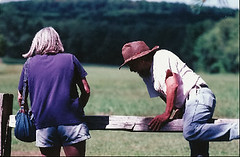
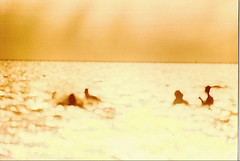
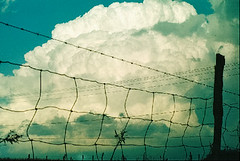
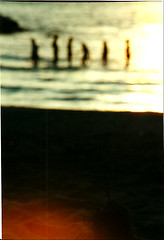
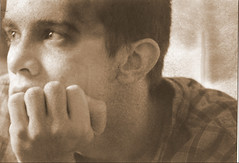
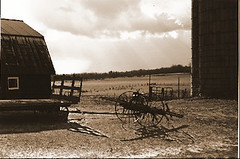
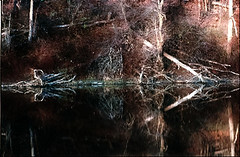






0 Comments:
Post a Comment
<< Home